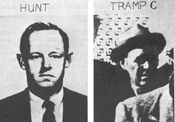Are You Sure (October 9): Difference between revisions
No edit summary |
No edit summary |
||
| Line 2: | Line 2: | ||
<span style="font-weight:bold">Are You Sure ... </span> | <span style="font-weight:bold">Are You Sure ... </span> | ||
• ... that American intelligence officer and writer '''[[E. Howard Hunt (nonfiction)|E. Howard Hunt]]''' (9 October 1918 – 23 January 2007) was a CIA officer from 1949 to 1970; and that Hunt, along with [[G. Gordon Liddy (nonfiction)|G. Gordon Liddy]] and others, | • ... that American intelligence officer and writer '''[[E. Howard Hunt (nonfiction)|E. Howard Hunt]]''' (9 October 1918 – 23 January 2007) was a CIA officer from 1949 to 1970; and that Hunt, along with [[G. Gordon Liddy (nonfiction)|G. Gordon Liddy]] and others, planned and committed [[Watergate scandal (nonfiction)|burglaries and other illegal undercover operations for the Nixon administration]]? | ||
• ... that mathematician and astronomer '''[[David Gregory (nonfiction)|David Gregory]]''' was made an Honorary Fellow of the Royal College of Physicians of Edinburgh in 1705; and that at the Union of 1707, Gregory was given the responsibility of re-organizing the Scottish Mint? | • ... that mathematician and astronomer '''[[David Gregory (nonfiction)|David Gregory]]''' was made an Honorary Fellow of the Royal College of Physicians of Edinburgh in 1705; and that at the Union of 1707, Gregory was given the responsibility of re-organizing the Scottish Mint? | ||
Revision as of 06:16, 10 October 2020

Are You Sure ...
• ... that American intelligence officer and writer E. Howard Hunt (9 October 1918 – 23 January 2007) was a CIA officer from 1949 to 1970; and that Hunt, along with G. Gordon Liddy and others, planned and committed burglaries and other illegal undercover operations for the Nixon administration?
• ... that mathematician and astronomer David Gregory was made an Honorary Fellow of the Royal College of Physicians of Edinburgh in 1705; and that at the Union of 1707, Gregory was given the responsibility of re-organizing the Scottish Mint?
• ... that mathematician, scholar, and poet Claude Gaspard Bachet de Méziriac (9 October 1581 – 26 February 1638) wrote a translation, from Greek to Latin, of the Arithmetica of Diophantus; and that it was this very translation in which Pierre de Fermat wrote his famous margin note claiming that he had a proof of Fermat's last theorem; and that the same text renders Diophantus' term παρισὀτης as adaequalitat, which became Fermat's technique of adequality, a pioneering method of infinitesimal calculus?
• ... that French Jewish artillery officer Alfred Dreyfus (9 October 1859 – 12 July 1935) was falsely accused of treason, brought to trial, and convicted in 1884; that his enemies were motivated by anti-Semitism; that his trial became one of the most tense political dramas in modern French history, with a wide echo throughout Europe; and that Dreyfus was completely exonerated?